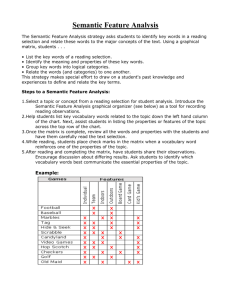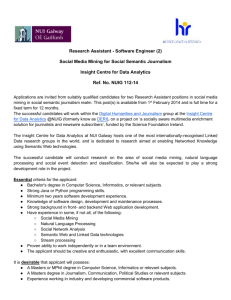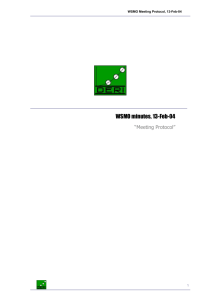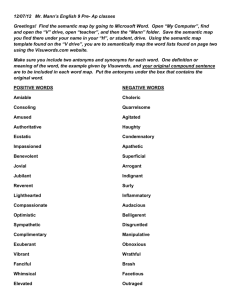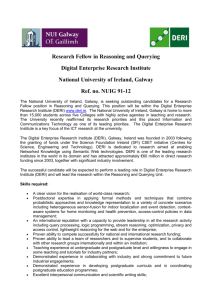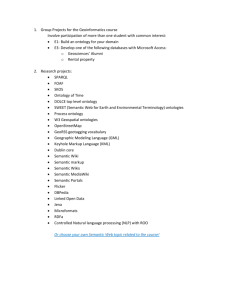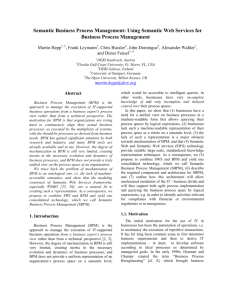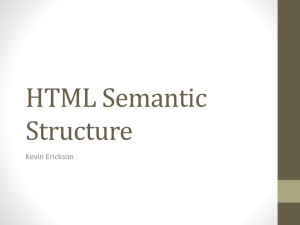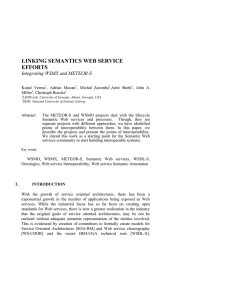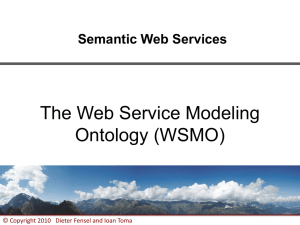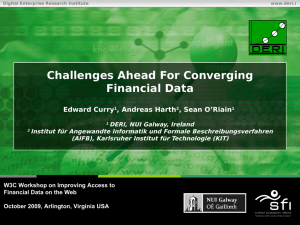WSMO Starts To Fly In Semantic Web Services Applications
advertisement
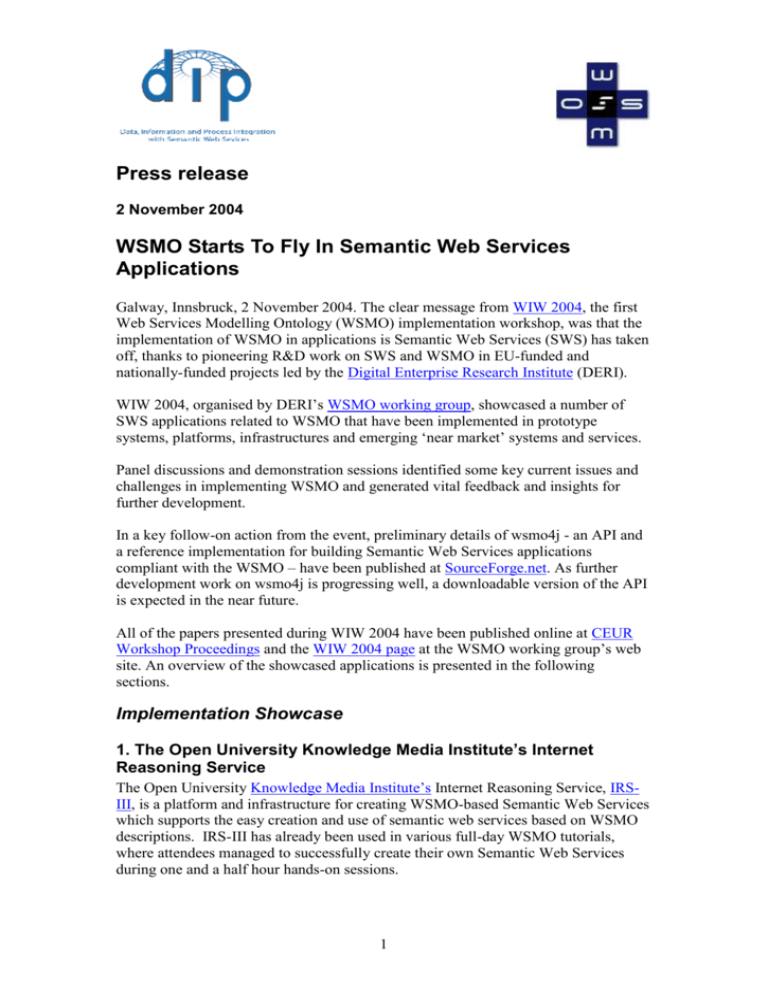
Press release 2 November 2004 WSMO Starts To Fly In Semantic Web Services Applications Galway, Innsbruck, 2 November 2004. The clear message from WIW 2004, the first Web Services Modelling Ontology (WSMO) implementation workshop, was that the implementation of WSMO in applications is Semantic Web Services (SWS) has taken off, thanks to pioneering R&D work on SWS and WSMO in EU-funded and nationally-funded projects led by the Digital Enterprise Research Institute (DERI). WIW 2004, organised by DERI’s WSMO working group, showcased a number of SWS applications related to WSMO that have been implemented in prototype systems, platforms, infrastructures and emerging ‘near market’ systems and services. Panel discussions and demonstration sessions identified some key current issues and challenges in implementing WSMO and generated vital feedback and insights for further development. In a key follow-on action from the event, preliminary details of wsmo4j - an API and a reference implementation for building Semantic Web Services applications compliant with the WSMO – have been published at SourceForge.net. As further development work on wsmo4j is progressing well, a downloadable version of the API is expected in the near future. All of the papers presented during WIW 2004 have been published online at CEUR Workshop Proceedings and the WIW 2004 page at the WSMO working group’s web site. An overview of the showcased applications is presented in the following sections. Implementation Showcase 1. The Open University Knowledge Media Institute’s Internet Reasoning Service The Open University Knowledge Media Institute’s Internet Reasoning Service, IRSIII, is a platform and infrastructure for creating WSMO-based Semantic Web Services which supports the easy creation and use of semantic web services based on WSMO descriptions. IRS-III has already been used in various full-day WSMO tutorials, where attendees managed to successfully create their own Semantic Web Services during one and a half hour hands-on sessions. 1 IRS-III will feature in a tutorial on Tools and Technologies for Semantic Web Services at the International Semantic Web Conference (ISWC 04) on 7-11 November 2004 in Hiroshima, Japan. The tutorial will be given by KMi, DERI Galway and Carnegie Mellon University. 2. The Web Services Execution Environment (WSMX) DERI Galway highlighted the features and functions of the Web Services Execution Environment (WSMX), which provides a conceptual model, architecture and implementation of a Semantic Web Services execution environment. WSMX allows a goal provided by a service requester to be matched to a Web Service at runtime and for this service to be executed. WSMX combines the technologies of the Semantic Web and Web Services and is a reference implementation for WSMO. The first version of WSMX provides a robust service oriented architecture that provides a framework for ongoing research in the area of Semantic Web Services and in particular for WSMO. WSMX version 0.1 is available as open source at SourceForge.net. 3. Demonstrating WSMX - Use Case: Ordering Broadband Internet Niwa Web Solutions and DERI Galway selected a use case from the telecommunication sector to demonstrate how WSMX can be used to order a broadband internet connection. To stay competitive in the future market, vendors need technologies for the easy and flexible integration of providers that offer such services. While the implementation demonstrated that WSMX provides the technology to support this use case, it also made clear that the general assumption of WSMX - that providers should completely describe the functionality of their services at design time – is unreasonable. The developers presented a general solution to this problem and showed how to implement it. Future work will address the two shortcomings noted above; firstly, to extend the logical language and secondly, to include a process modelling component in WSMX that is able to execute complex goals. 4. GODO – a personal agent for the goal driven orchestration for Semantic Web Services GODO uses a natural language front-end that enables users to specify goals such as: “I want to buy a plane ticket from Galway to Madrid, then book a hotel in the centre and then rent a C class car”. GODO was developed by the Universidad Autónoma de Madrid and the Universidad de Murcia Murcia. Current technologies would just index these words in a more or less meaningless fashion and try to find purely syntactic relationships among them. However, GODO 2 goes further and classifies the goals loaded from the WSMO repository, which are then chained and orchestrated before being sent and performed by WSMX. 5. WOOGLE meets Semantic Web Fred With WOOGLE meets Semantic Web Fred, DERI Innsbruck outlined a general approach for Web Service Discovery in WSMO, and defined a conceptual model as well as means for realization of WOOGLE. As a basic but powerful discovery mechanism for SWS, WOOGLE is intended to be provided as a standard discoverer within WSMO. Although the overall Web Service Discovery is comprised of further and extendable steps, WOOGLE is a generic WSMO-compliant solution. 6. WSMO Studio WSMO Studio is a Semantic Web Service editor compliant with WSMO and based on SWWS Studio. WSMO Studio will be available as a set of Eclipse plug-ins that will facilitate reusability and extension by third parties. WSMO Studio is being developed by OntoText Lab and DERI Innsbruck, who hope to have it flying towards the end of 2004. Robust, mature and easy-to-use tools play a crucial role in facilitating the adoption of any new technology, where the overall value of a technological innovation can be severely undermined by the lack of proper tools. SWWS Studio is a prototype system that supports WSMO, making the technology easy to use and transparent to the end user. More About WSMO WSMO is based on four concepts: web services, ontologies, goals and mediators. Web services are units of functionality; every web service has exactly one capability, that describes logically what this web service can offer. Every web service has a number of interfaces, which specify how to communicate with it. WSMO is designed to become a standard; the most recent version of the core specification is published here on the WSMO site. Goals describe some state that a user may want to achieve. Ontologies are the formal specification of the knowledge domain used by both the web service to express its capability, and by the goal to express the desired world state. Mediators are used to solve different interoperability problems, like differences in ontologies used by a web service and a goal. More About The WSMO Working Group DERI’s WSMO working group aims to further the development of Semantic Web Services by working towards further standardization in the area of SWS languages, and through the development and implantation of a common architecture and platform for SWS. DERI is following an open source strategy in order to facilitate the uptake of WSMO by both industry and the academic community. 3 This is being achieved by creating synergies and aligning ongoing work and emerging results of three key European research projects in the Semantic Web Service area: DIP-Data, Information, and Process Integration with Semantic Web Services, Knowledge Web - a Network of Excellence that aims to support the transfer of Ontology technology from Academia to Industry, and SEKT- Semantically Enabled Knowledge Technologies. These three projects are part of the SDK project cluster, which aims to strengthen European research and industry in the fields of Semantic Web and Semantic Web Services and is working towards international standardization together with the USbased DAML initiative. SDK promotes awareness and take-up of SWS research results by both industry and academia through co-ordinated dissemination activities designed to boost European research, enable sources of competitive advantage for European industry and strengthen world-wide research and standardization. CONTACT INFORMATION: Contact Person: Organisation Name: Phone Number: Fax Number: E-Mail: Website URL: Holger Lausen Digital Enterprise Research Institute (DERI) +43 512 507 6464 +43 512 27287817 holger.lausen@deri.org http://www.DERI.org/ For more information on WSMO, visit http://www.wsmo.org/ For more information on DIP, visit http://dip.semanticweb.org/ For more information on DERI, visit http://www.DERI.org/ 4

